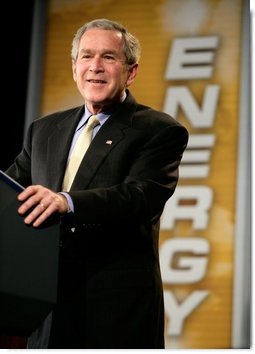 Energy is the theme of presidential appearances around the country this week, as promised in the President’s Saturday radio address. He started off today in Milwaukee, Wisconsin at Johnson Controls. Much of the president’s remarks focused on investment in new energy technology, such as what is being done at Johnson Controls, especially developing new batteries for hybrid vehicles – advanced lithium ion batteries that are now used in cell phones and laptops. These batteries are lighter, they are more powerful, and they can be recharged quickly. Using new lithium ion batteries, engineers will be able to design the next generation of hybrid vehicles, called plug-in hybrids, that can be recharged through a standard electrical outlet.
Energy is the theme of presidential appearances around the country this week, as promised in the President’s Saturday radio address. He started off today in Milwaukee, Wisconsin at Johnson Controls. Much of the president’s remarks focused on investment in new energy technology, such as what is being done at Johnson Controls, especially developing new batteries for hybrid vehicles – advanced lithium ion batteries that are now used in cell phones and laptops. These batteries are lighter, they are more powerful, and they can be recharged quickly. Using new lithium ion batteries, engineers will be able to design the next generation of hybrid vehicles, called plug-in hybrids, that can be recharged through a standard electrical outlet.
President Bush also discussed ethanol, which he noted can be used in hybrid vehicles.
Now, we’re on the edge of advancing additional ethanol production. New technology is going to make it possible to produce ethanol from wood chips and stalks and switch grass, and other natural materials. Researchers at the Energy Department tell me we’re five or six years away from breakthroughs in being able to produce fuels from those waste products. In other words, we’re beginning to — we’re coming up with a way to make something out of nothing. And this is important because it’s — economics are such that it’s important to have your ethanol-producing factories or plants close to where the product is grown.
That’s why E85 has spread throughout the Midwest, that’s where you’re growing the corn. Pretty soon, you know, if you’re able to grow switch grass and convert that into ethanol, then you’re going to have availability for ethanol in other parts of the country. I mean, there’s a lot of stuff that gets thrown away that may be converted into fuel, but it’s not just located in one part of the country — it’s located around the country. And one of the goals is to make sure that ethanol is widespread. If we want to affect our consumption of oil, we want ethanol to be readily available for consumers outside certain parts of the — certain regions of the country.
And so we proposed spending $150 million for government and private research into these homegrown fuels. It’s an important initiative. We want to provide our consumers with reasonable, cost-effective ways to help us become less dependent on foreign sources of oil.
The third alternative vehicle fuel discussed by the president was hydrogen. When hydrogen is used in a device called a fuel cell, it can deliver enough electricity that could power a car that emits pure water instead of exhaust fumes. It’s an exciting new technology. We’re a ways down the road from bringing it to fruition, but we are spending $1.2 billion over five years to research this important opportunity.
Also noteworthy were the president’s remarks about natural gas and coal. Coal has the potential to reduce our reliance on natural gas. The problem is we’ve got to make sure that we can keep our commitment to the environment. Coal requires investment to make sure that we don’t pollute our air. And that’s the conundrum, that’s the difficulty with coal. This country is — I told you we’ve reduced our air pollution by 50 percent, in spite of the fact that our economy has grown substantially. We want to continue that commitment.
Lots, lots more good stuff in the president’s address today – read it all here on the White House website. Go to the Johnson Controls website if you want to watch the archived webcast.
It’s very notable that he is not taking a “one-size-fits-all” approach to this goal of reducing our dependence on foreign oil – it’s going to take a combination of different domestic energy sources, lots of research and serious commitment on everyone’s part to both finding alternatives and conserving energy whenever possible.
Tuesday, Bush will visit the National Renewable Energy Laboratory in Colorado to talk more about getting domestic fuel in the pipeline as fast as possible.

